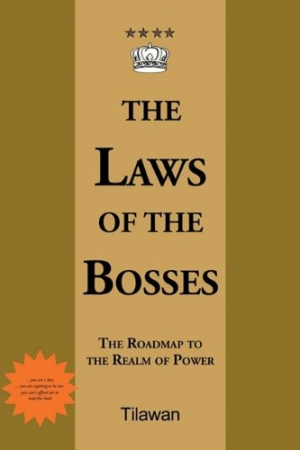The Laws of the Bosses
The concept of The Laws of the Bosses is intriguing. Solie Tilawan, who holds a master’s degree in international relations and diplomacy, writes that when he decided to start a career in motivational writing, “the laws of the bosses” was the first subject he wanted to address because “they are the ones whom to a large extent determine the success of millions of ordinary people like us.” Tilawan defines the laws of the bosses as “their guidelines for coming to power, controlling power and most importantly, holding on to power.”
Tilawan divides the book into three parts: “Power and the Boss,” “The Boss and the Subordinate,” and “The Boss and the Law.” The author includes short chapters in each section that cover particular aspects of being a boss. For example, in the chapter “The Boss and His Subordinates” (which appears in part one but would probably be more appropriate in part two), Tilawan makes some observations about the relationship between a boss and those who work for him or her. These include statements like, “the closer you are to the boss the more your acts of disloyalty magnify before him,” and “Around the boss you will always find people masquerading as friends, subordinates, or even sympathizers but they do not truly belong.”
Similarly, in the chapter “Sharing with the Boss” in part two, Tilawan writes, “The rich and powerful love segregation.” He later asserts, “The rich do not only want to become richer but also want to stop others from being as rich or enjoying as much privileges as they do.”
Such statements seem to be highly subjective, unsubstantiated, and based on sweeping generalizations. While the author does include numerous examples to support his argument, the majority of the references he uses are military and political leaders. In fact, most of the discussion centers around bosses most readers would classify as dictators rather than bosses in the workplace, the more traditional definition.
Unfortunately, The Laws of the Bosses suffers from another deficiency. While Tilawan does a good job describing the examples, the book is, for the most part, challenging to read. The writing includes complex run-on sentences, grammatical errors, and, at times, lacks clarity. For instance, this sentence appears in the prologue: “Don’t be carried away, under such slogans might be seated one of the terrible bosses in history, as a young man starting a career, always imaging the man you meet in authority is a boss, if he turns out otherwise—better, if not?”
Typically, a book that targets business readers is written in simple, clear language, with short paragraphs, bulleted points, subtitles, and chapter summaries. This volume has none of these attributes. Despite its interesting premise, The Laws of the Bosses is likely to be of limited value to its intended audience.
Reviewed by
Barry Silverstein
Disclosure: This article is not an endorsement, but a review. The publisher of this book provided free copies of the book and paid a small fee to have their book reviewed by a professional reviewer. Foreword Reviews and Clarion Reviews make no guarantee that the publisher will receive a positive review. Foreword Magazine, Inc. is disclosing this in accordance with the Federal Trade Commission’s 16 CFR, Part 255.

